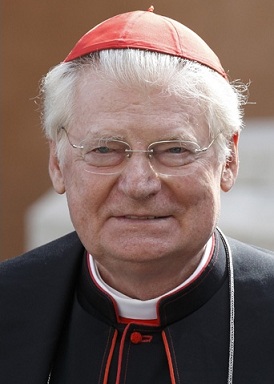[ by Charles Cameron — thinking today of the Church in terms of its “foreign policy” and the “Islamic world” ]
.
It’s worth looking at John Allen‘s list of papabili from the most recent conclave, the 2005 conclave that elected Joseph Ratzinger to the papacy, before reading the twelve names he offered CNN for the upcoming election — if only to note that Ratzinger’s own name is conspicuously absent from the list of likely candidates…
It is also worth remembering the response then-Cardinal Ratzinger gave to a reporter in a 1997 interview:
INTERVIEWER: “Your Eminence, you are very familiar with church history and know well what has happened in papal elections. . . . Do you really believe that the Holy Spirit plays a role in the election of the pope?”
RATZINGER: “I would not say so in the sense that the Holy Spirit picks out the pope, because there are too many contrary instances of popes the Holy Spirit would obviously not have picked. I would say that the Spirit does not exactly take control of the affair, but rather like a good educator, as it were, leaves us much space, much freedom, without entirely abandoning us. Thus the Spirit’s role should be understood in a much more elastic sense, not that he dictates the candidate for whom one must vote. Probably the only assurance he offers is that the thing cannot be totally ruined.”
**
Bearing that in mind, and given the current world context in which the issue of reform within the church is receiving the most fervent press attention, I’d like to pause for a moment to consider “foreign affairs” — and more specifically the Church’s relations with the Islamic world, since the next pope has the opportunity here to be a bridge builder, a literal pontifex, a peacemaker if he so chooses — or a divider, an antagonist.
I am therefore particularly interested in the possibility that Angelo Card. Scola might be elected to the papacy, since he has been involved for some time in Catholic-Islamic dialog through his Oasis project:
The ‘mestizaje of civilisations and cultures’. This refers to the ongoing, novel historical process of mixing of peoples and cultures. Hybridization is neither a theory about cultural integration, nor a general notion explaining realty. It is simply an acknowledgment of a situation that we must all face, whether we like or not, individually or collectively, that requires that each one of us to try to influence it for the better. On the basis of this notion the Oasis Centre aims at transcending certain frames of reference and concepts like multiculturalism, integration and reciprocity that are proving increasingly inadequate to explain the increasing interaction of peoples. It is clear that reflecting upon it cannot be done without taking into consideration the contribution of various religions and the way they themselves interact. In particular the Centre’s focus is on the relationship between Christians and Muslims.
Scola is currently the archbishop of Milan, and was previously patriarch of Venice. For a closer look at his work with what he accurately terms “the Islams” see his 2008 op-ed, The Freedom to Convert and interview with John Allen on “popular Islam”.
**
For myself, I was particularly interested in his response to a question from Allen in a 2009 interview on Shi’ite messianism:
ALLEN: What are you hearing from your contacts in Iran these days? Looking down the line, it seems that Shi’a Muslims and Catholics share certain traits: A strong clerical hierarchy, a theology of sacrifice, and deep currents of popular devotion. Does this suggest that Catholicism can play an important role in a dialogue with Iran, where Shi’a Islam is dominant?
SCOLA: Three accents strike me in the Shi’a tradition: the necessity of a continual actualization of revelation in certain physical persons, to the point of overcoming a too-rigid conception of divine transcendence; the lively expectation of eschatological fulfillment; and the reflection on the problem of evil. I have the impression that we’re not well informed on these points, despite the enormous work of study and analysis that’s been done by specialists in recent years. We know Shi’ites better than we know Shi’ism!
The Oasis network really hasn’t arrived yet in Iran, so what I know about what’s happening is what I see and read in the mass media. I don’t doubt, however, that many people in Iran want better relations with the West. We must not forget that Persian culture has shown itself to be extraordinarily fertile and receptive.
The principal problem, if I can put it slightly audaciously, is that Shi’ite messianism, almost unable to bear the weight of the expectations with which it is structurally bound up, has been converted over the centuries, at least in some circles, into a political ideology. We’re talking about a long process that’s not linear, which experience a brusque acceleration with the 1979 revolution. As Westerners, we were caught off guard. We had forgotten that history is also sometimes forged by ‘theological options.’
In any event, all this is reversible.
A comparison of the Shi’ite Ta’zieh “passion plays” mourning the martyrdom of Husayn at Kerbala with the equivalent Catholic play at Oberammergau memorializing the passion of Christ confirms the resemblance Allen suggests between the “theology of sacrifice, and deep currents of popular devotion” in Shi’a Islam and Catholicism respectively.
As for our lack of awareness of the contemporary pull of Islamic eschatology, Scola’s words mirror one of my own concerns to a T:
As Westerners, we were caught off guard. We had forgotten that history is also sometimes forged by ‘theological options.’




